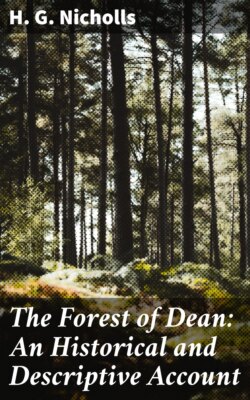The Forest of Dean: An Historical and Descriptive Account

Реклама. ООО «ЛитРес», ИНН: 7719571260.
Оглавление
H. G. Nicholls. The Forest of Dean: An Historical and Descriptive Account
The Forest of Dean: An Historical and Descriptive Account
Table of Contents
PREFACE
CHAPTER I. a.d. 1307–1612
CHAPTER II. a.d. 1612–1663
CHAPTER III. AD 1663–1692
CHAPTER IV. a.d. 1692–1758
CHAPTER V. a.d. 1758–1800
CHAPTER VI. a.d. 1800–1831
CHAPTER VII. a.d. 1831–1841
CHAPTER VIII. a.d. 1841–1858
CHAPTER IX. THE ORIGINAL OCCUPIERS OF THE FOREST
CHAPTER X
CHAPTER XI
CHAPTER XII
CHAPTER XIII
THE TIMBER
CHAPTER XIV
CHAPTER XV
CHAPTER XVI
APPENDIX
No. I. Papers preserved in the Lansdowne Collection at the British Museum
No. II. One of the Dean Forest Claims, put in at the Justice Seat, held in Gloucester Castle, 10 Chas. I
No. III
TABLE I.—FORMED BY MR. MACHEN
TABLE 2.—FORMED BY MR. MACHEN
TABLE 3.—FORMED BY MR. MACHEN
TABLE 4.—FORMED BY MR. MACHEN
FIRST PART
SECOND PART
TABLE 5.—FORMED BY MR. MACHEN
FIRST PART
SECOND PART
No. IV. Mr. Wyrrall’s Survey of the Forest of Dean Iron Works in 1635
No. V. Dr. Parson’s description of the mode of making Iron
No. VI. Being Minutes, &c., of the Court of Mine Law
NOTES
Отрывок из книги
H. G. Nicholls
Published by Good Press, 2019
.....
Some idea may be formed of the strength of public feeling against Sir John Winter, on account of his wholesale fellings of the Forest timber, by the decision which Mr. Pepys records his “cousin Roger” to have given upon him, viz. that “he deserves to be hanged.” In order that the mischief might be put an end to as soon as possible, late as it was in the session, a bill was brought into the House for settling the Forest, and preserving and improving the wood and timber. Parliament was prorogued, however, before the bill could pass, and its promoters had to be content with the House “recommending the Lord Treasurer and the Chancellor of the Exchequer to take care for the preservation and improvement of the Forest.” This recommendation appears to have had no influence on Sir John Winter, for on a new survey made in 1667 it was reported to Government that out of the 30,233 trees sold to him, only about 200 remained standing, and that from 7000 to 8000 tons of timber, fit for his Majesty’s navy, was found wanting. He would seem to have felt some alarm at this report, for twice about this time he resorted to Mr. Pepys, who writes, 15th March, 1667—“This morning I was called up by Sir John Winter, poor man, come in a sedan from the other end of the town, about helping the King in the business of bringing down his timber to the sea-side in the Forest of Deane;” and again 30th April, “Sir John Winter, to discourse with me about the Forest of Deane.”
All the propositions sent up to the Government in 1663 were incorporated in the Act of 20 Charles II., chap. 3, which also provided that the new enclosures should be perfected within two years, in favourable and convenient places, the cost of making and maintaining them being met by the sale of such trees as would never prove timber; that no trees were to be felled until they had been viewed and marked by two or more justices of the peace, under a penalty of twenty pounds; that no fee-trees were to be allowed, and all grants to be void; that every freeholder might do what he pleased with his land; that no enclosure was to be mined, quarried, or trespassed in; that the bounds of the Forest were to remain as settled in 20 James I.; that all lawful rights and privileges relating to its minerals were to continue, with permission to the Crown to lease coal-mines and stone-quarries for periods not exceeding thirty-one years; that the letters-patent granted for a term not expired to Sir John Winter, Kt., Francis Finch and Robert Clayton, Esqs., should remain good, as also, certain leases granted to Thomas Preston, Esq., and Sir Edward Villiers, Kt. After all that had occurred, it seems strange that Sir John Winter should have obtained permission by Act of Parliament to retain his patent; he had however several powerful friends, and also strong claims on the Crown in consideration of his services during the civil war.
.....